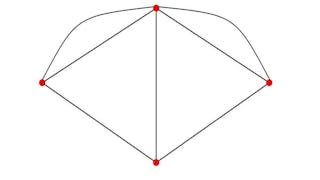- Browse
- Music Theory
Results for "music theory"
 Status: NewNewStatus: PreviewPreviewS
Status: NewNewStatus: PreviewPreviewSSkillsBooster Academy
Skills you'll gain: Generative AI, AI Product Strategy, Brand Strategy, Content Creation, Business Communication, Storytelling, Media Production, Brand Awareness, Social Media Content, Digital Design, Business Ethics, Marketing Communications, Creative Thinking, Influencing, Business Transformation, Entrepreneurship, Creative Problem-Solving, Media and Communications, Customer Engagement, Digital Marketing
Beginner · Course · 1 - 3 Months
 Status: PreviewPreviewS
Status: PreviewPreviewSStanford University
Skills you'll gain: Social Network Analysis, Network Analysis, Sociology, Socioeconomics, Economics, Policy, and Social Studies, Game Theory, Mathematical Modeling, Statistical Modeling, Markov Model, Bayesian Statistics, Probability, Simulations
4.8·Rating, 4.8 out of 5 stars759 reviewsAdvanced · Course · 1 - 3 Months
 Status: NewNewStatus: Free TrialFree TrialA
Status: NewNewStatus: Free TrialFree TrialAAlex Genadinik
Skills you'll gain: TikTok, Case Studies, Advertising, Digital Advertising, Drive Engagement, Growth Strategies, Social Media Campaigns, Customer Engagement, Social Media Marketing, Social Media, Target Audience, Marketing Strategies, Video Production, Content Creation
Mixed · Course · 1 - 4 Weeks
 Status: NewNewStatus: Free TrialFree Trial
Status: NewNewStatus: Free TrialFree TrialBeginner · Course · 1 - 4 Weeks
 Status: Free TrialFree TrialU
Status: Free TrialFree TrialUUniversity of California, Davis
Skills you'll gain: Responsive Web Design, Color Theory, Version Control, Typography, HTML and CSS, Cascading Style Sheets (CSS), Hypertext Markup Language (HTML), GitHub, Git (Version Control System), Web Design, Web Design and Development, Web Development, Web Content Accessibility Guidelines, Front-End Web Development, Image Quality, Web Applications, Animations, Web Content, Mobile Development, User Interface (UI) Design
4.7·Rating, 4.7 out of 5 stars3.7K reviewsBeginner · Specialization · 3 - 6 Months
 Status: PreviewPreviewC
Status: PreviewPreviewCColumbia University
Skills you'll gain: International Finance, Derivatives, Financial Systems, Balance Sheet, Financial Market, Payment Systems, Banking, Capital Markets, Economics, Market Liquidity, Financial Regulation, Finance, Market Dynamics
4.9·Rating, 4.9 out of 5 stars1.7K reviewsMixed · Course · 3 - 6 Months
 Status: Free TrialFree TrialU
Status: Free TrialFree TrialUUniversity of California, Irvine
Skills you'll gain: Editing, Writing, Proofreading, Report Writing, English Language, Style Guides
4.7·Rating, 4.7 out of 5 stars3.3K reviewsMixed · Course · 1 - 3 Months
 U
UUniversity of Illinois Urbana-Champaign
Skills you'll gain: Environmental Policy, Sustainable Development, Environment, Water Resources, Demography, Energy and Utilities, Environmental Science, Environmental Resource Management, Sustainability Standards, Sustainable Engineering, Water Resource Management, Social Sciences, Climate Change Adaptation, Economics
4.8·Rating, 4.8 out of 5 stars2.7K reviewsMixed · Course · 1 - 3 Months
 Status: NewNewStatus: Free TrialFree Trial
Status: NewNewStatus: Free TrialFree TrialSkills you'll gain: Photo Editing, Adobe Illustrator, Color Theory, Adobe Express, Adobe Photoshop, Responsible AI, Typography, Generative AI, Graphic and Visual Design, Graphic Design, Graphics Software, Graphic and Visual Design Software, Photography, Design, Adobe Creative Cloud, Design Elements And Principles, Digital Design, File Management, Branding, Storytelling
4.7·Rating, 4.7 out of 5 stars1.2K reviewsBeginner · Specialization · 1 - 3 Months
 Status: Free TrialFree TrialU
Status: Free TrialFree TrialUUniversity of Toronto
Skills you'll gain: Computer Vision, Convolutional Neural Networks, Image Analysis, Control Systems, Robotics, Embedded Software, Automation, Deep Learning, Software Architecture, Simulations, Safety Assurance, Traffic Flow Optimization, Artificial Neural Networks, Global Positioning Systems, Machine Controls, Hardware Architecture, Systems Architecture, Network Routing, Estimation, Machine Learning Methods
4.7·Rating, 4.7 out of 5 stars3.5K reviewsAdvanced · Specialization · 3 - 6 Months
 Status: Free TrialFree TrialU
Status: Free TrialFree TrialUUniversity of Pennsylvania
Skills you'll gain: People Analytics, Human Capital, Human Resource Strategy, Human Resources, Talent Management, Organizational Effectiveness, Workforce Management, Analytics, Performance Measurement, Employee Performance Management, Data-Driven Decision-Making, Performance Analysis, Network Analysis, Employee Retention, Performance Management, Collaboration, Data Analysis, Predictive Analytics
4.6·Rating, 4.6 out of 5 stars6.2K reviewsMixed · Course · 1 - 4 Weeks
 Status: Free TrialFree TrialStatus: AI skillsAI skills
Status: Free TrialFree TrialStatus: AI skillsAI skillsSkills you'll gain: Adobe Express, Responsible AI, Logo Design, Digital Design, Layout Design, Generative AI, Social Media, Content Creation, Graphic Design, Social Media Management, Creative Design, Adobe Photoshop, Visual Design, Content Marketing, Infographics, Content Strategy, Typography, Color Theory, Storytelling, Branding
4.7·Rating, 4.7 out of 5 stars2.4K reviewsBeginner · Professional Certificate · 3 - 6 Months
In summary, here are 10 of our most popular music theory courses
- AI Sound Generation for Business Communication: SkillsBooster Academy
- Social and Economic Networks: Models and Analysis: Stanford University
- How I Got 1k Followers In 1 Day: TikTok Marketing & Ads: Alex Genadinik
- Master Keying Techniques in After Effects: EDUCBA
- Web Development for Beginners: University of California, Davis
- Economics of Money and Banking: Columbia University
- Getting Started with Essay Writing: University of California, Irvine
- Introduction to Sustainability: University of Illinois Urbana-Champaign
- Generative AI in Adobe Creative Cloud: Adobe
- Self-Driving Cars: University of Toronto










